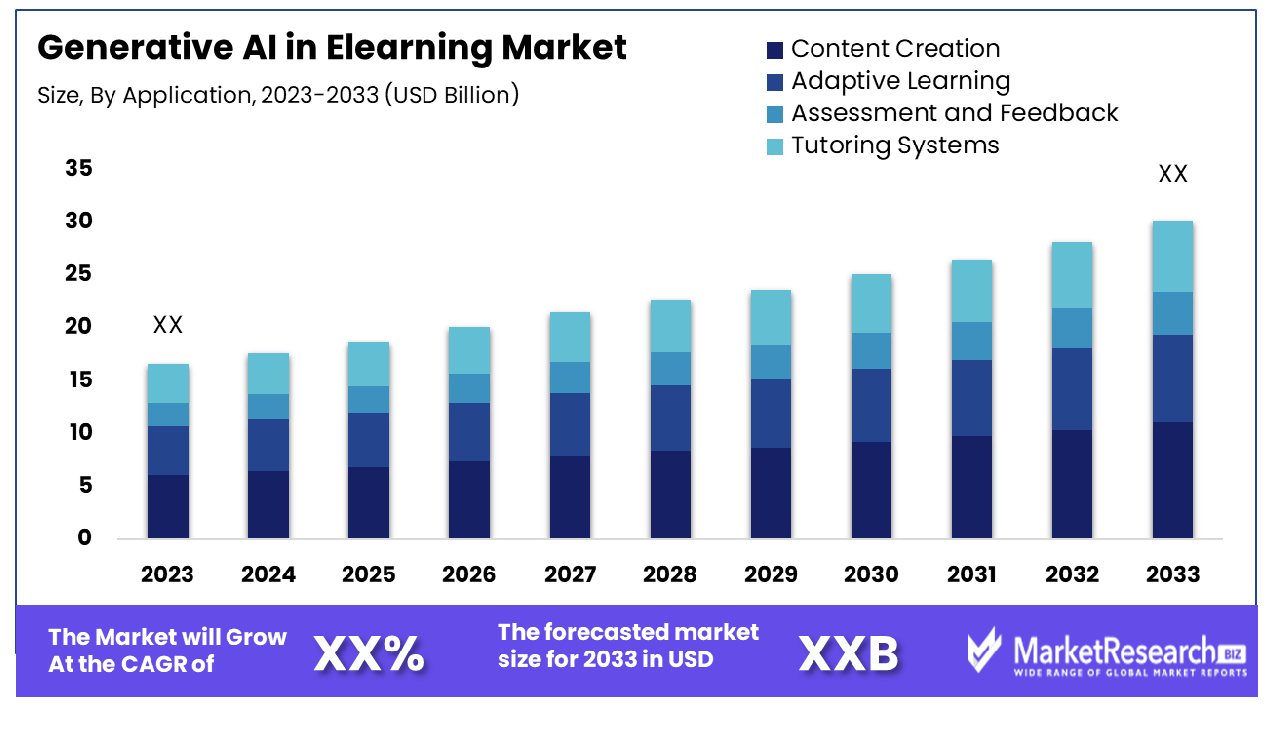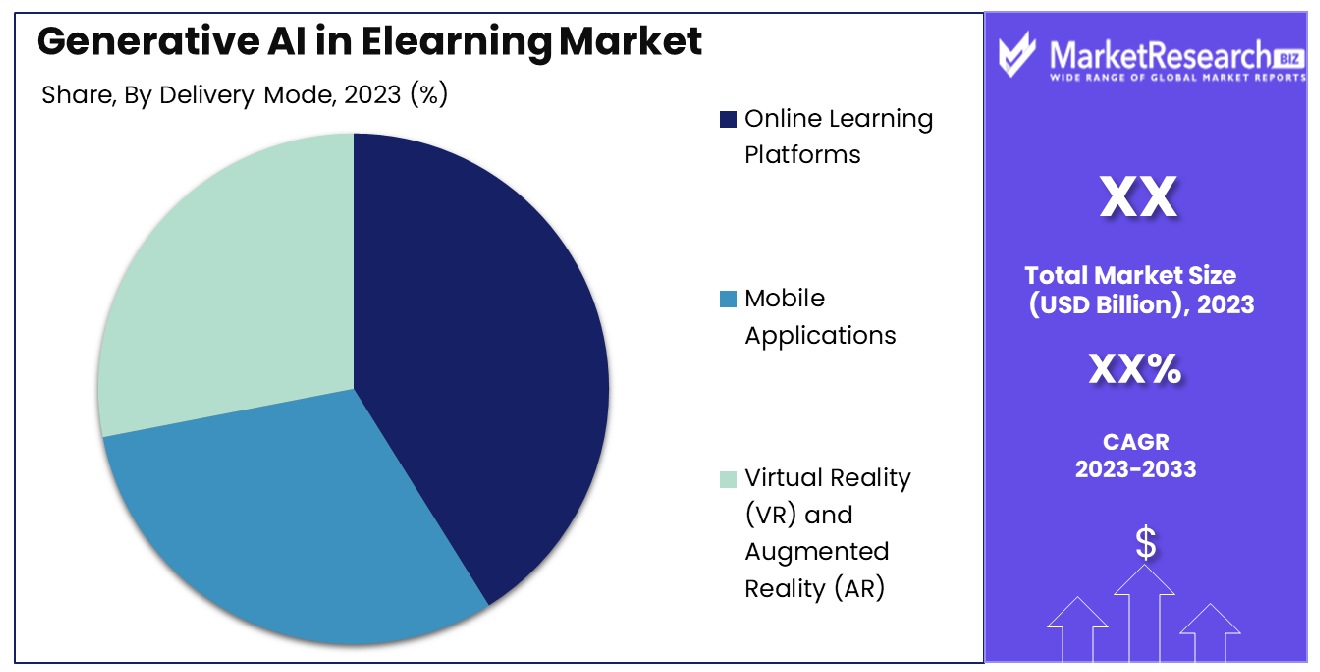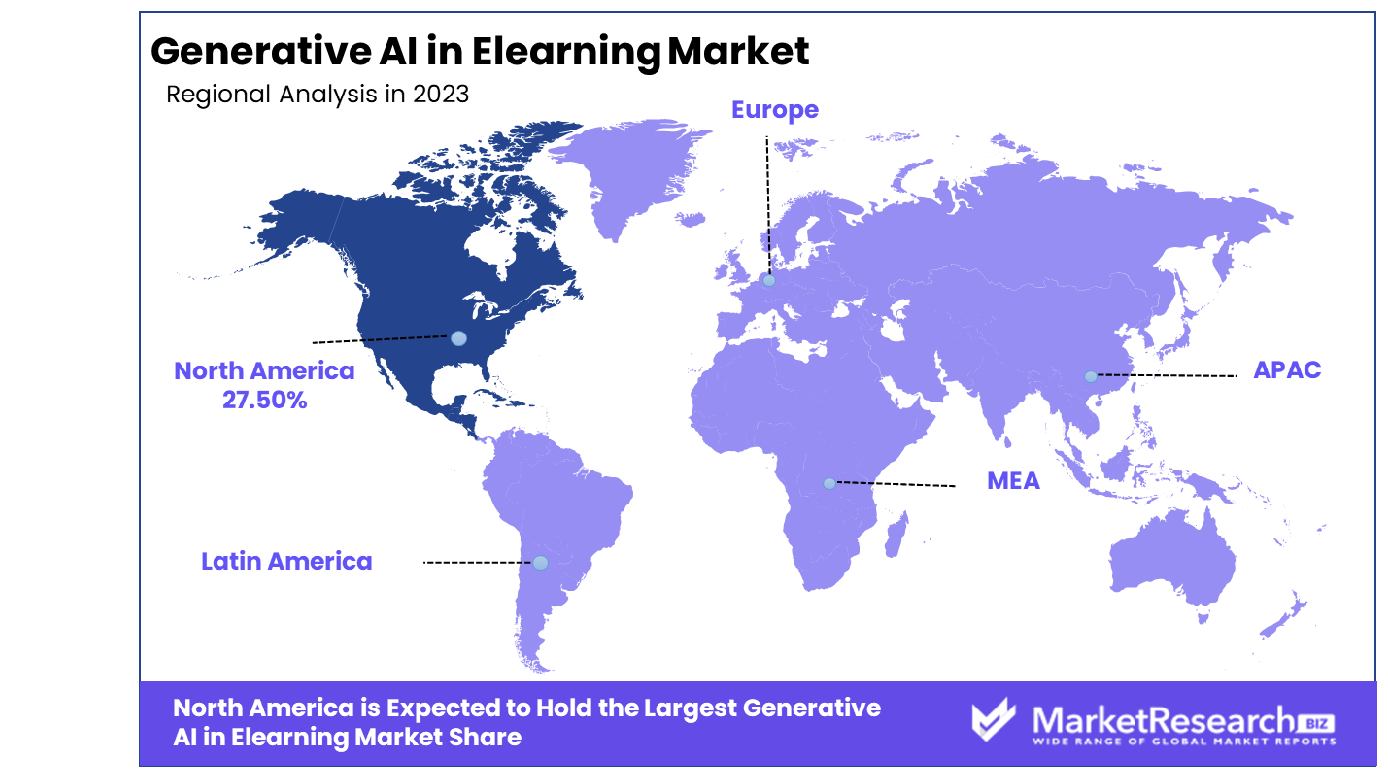
Generative AI in Elearning Market By Application(Content Creation, Adaptive Learning, Assessment and Feedback, Tutoring Systems), By Delivery Mode(Online Learning Platforms, Mobile Applications, Virtual Reality (VR) and Augmented Reality (AR)), By End-User(Students/Individual, Educators/Trainers, Institutions), By Region And Companies - Industry Segment Outlook, Market Assessment, Competition Scenario, Trends, And Forecast 2024-2033
-
43885
-
March 2024
-
179
-
-
This report was compiled by Correspondence Linkedin | Detailed Market research Methodology Our methodology involves a mix of primary research, including interviews with leading mental health experts, and secondary research from reputable medical journals and databases. View Detailed Methodology Page
-
Report Overview
The generative AI in e-learning market was valued at USD XX billion by 2023. It is expected to reach USD XX billion by 2033, with a CAGR of XX% during the forecast period from 2024 to 2033. The surge in demand for advanced technologies and the rise in online teaching platforms are some of the main key driving factors for generative AI in the e-learning market.
The generative AI in e-learning is defined as the applications of artificial intelligence methods that are specifically generative models to improve the eLearning experience. Generative AI algorithms like generative adversarial networks or variational autoencoders have the potential to develop new content that replicates the patterns and styles of existing data. In eLearning, this technology can be used to produce customized learning materials that comprise interactive quizzes, simulation situations, or even whole course modules costumed to individual students’ requirements and choices.

By analyzing learners’ interactions and performance data, generative AI can animatedly adapt content to boost engagement and knowledge retention. Moreover, it can help in the development of realistic virtual environments for training methods by providing a large set of learning process experiences. The generative AI in e-learning upholds the promise of changing how educational content is offered and customized by nurturing more effective and appealing continuous learning journey experiences for students of all levels.
Enfin Technologies in January 2024, highlights that the influence of generative AI is transforming the landscape of education. The forecasts indicate that by 2024, approximately 47% of learning management systems will harness the power of AI. These advanced technologies have the potential that permit e-learning platforms to offer personalized, immersive, and dynamic educational encounters by setting new guidelines for engagement. Generative AI in e-learning has gained much attention due to its potential to develop dynamic and customized learning experiences at scale.
By harnessing, generative models, e-learning platforms can produce customized content, adaptive assessments, and realistic simulations that can offer individual learner choices and abilities. This requires a rise in engagement, knowledge retention, and skill acquisition. Additionally, generative AI makes the quick development of new learning materials by maintaining pace with the surge in educational requirements and trends.
It also encourages educators to offer more effective and efficient machine-learning experiences by improving approachability and inclusivity in education for learners globally. The demand for generative AI in e-learning will increase due to its requirement in the education sector and online platforms that will help in market expansion in the coming years.
Key Takeaways
- Market Growth: Generative AI in Elearning Market was valued at USD XX billion in 2023. It is expected to reach USD XX billion by 2033, with a CAGR of XX during the forecast period from 2024 to 2033.
- By Application: Content creation dominates various applications, reflecting a surge in demand for original digital material.
- By Delivery Mode: Online learning platforms lead in delivery mode, indicating a shift towards remote education methods.
- By End-User: Students/individuals take the lead as end-users, highlighting a growing preference for personalized learning experiences.
- Regional Dominance: North America holds a commanding 27.50% market share in the Generative AI eLearning sector.
- Growth Opportunity: Generative AI enables rapid content development in emerging fields, fostering growth opportunities for eLearning platforms. Personalization at scale enhances learning outcomes, democratizing access to tailored educational experiences and fueling market expansion.
Driving factors
Personalization at Scale Drives Market Growth
The integration of Generative AI in eLearning leverages advanced algorithms to offer unparalleled personalization at scale, significantly contributing to market expansion. This technology enables the creation of individualized learning pathways, content, and assessments, catering to the unique needs and learning paces of each student. By tailoring educational industry experiences, Generative AI not only enhances learner engagement but also improves digital learning outcomes.
This personalized approach, previously unattainable due to logistical and financial constraints, is now feasible for vast numbers of learners worldwide. The demand for such personalized learning experiences is driving the adoption of Generative AI technologies in the eLearning sector, forecasting a robust growth trajectory. This trend is expected to reshape educational models, making adaptive deep learning the norm and setting new standards for educational content delivery.
Reduced Content Creation Costs Drives Market Growth
Generative AI is revolutionizing the eLearning industry by significantly reducing content creation costs. By automating the generation of educational materials, including simulations and practice questions, this technology minimizes the need for manual labor and the associated expenses. This efficiency not only lowers production costs but also accelerates the development cycle of new experiential learning modules, enabling educational providers to rapidly update and expand their offerings.
The cost-effectiveness of Generative AI appeals to a broad spectrum of eLearning platforms, from small startups to established institutions, encouraging widespread adoption. This factor is crucial in driving market growth, as it allows for the allocation of resources toward improving other aspects of the learning experience, such as learner support and platform technology. The long-term implications include a more dynamic, responsive, and financially accessible eLearning landscape.
Engaging and Immersive Learning Drives Market Growth
Generative AI is at the forefront of transforming eLearning into a highly engaging and immersive experience. By creating interactive content, conversational language, and dynamic characters, Generative AI makes learning more enjoyable and effective. This enhanced engagement leads to improved retention rates and learning outcomes, key metrics for the success of eLearning platforms.
The ability of Generative AI to provide personalized tutoring further elevates the learning experience, making education not just more accessible but also more appealing to diverse learner demographics. The shift towards more engaging and immersive learning environments, powered by Generative AI, is a significant growth driver in the eLearning market. As these technologies evolve, they are expected to set new benchmarks for educational content, making learning not just a necessity but a pleasure, thereby expanding the market's reach and impact.
Restraining Factors
Perceived Credibility Restrains Market Growth
The integration of Generative AI in eLearning faces skepticism due to concerns over the accuracy and ethical implications of AI-generated content. Educators and institutions are cautious, as the credibility of content directly impacts learning outcomes and the integrity of educational offerings.
The reluctance to fully embrace Generative AI without extensive validation limits its adoption, as the potential risk of disseminating incorrect or biased information could undermine educational standards and student trust. This challenge is significant, as establishing the reliability of AI-generated content requires rigorous testing and continuous monitoring, slowing the technology's acceptance and integration into mainstream educational practices.
Upfront Costs Restrains Market Growth
The adoption of Generative AI technology in the eLearning sector is significantly hampered by the substantial upfront investments required. Developing or acquiring high-quality generative AI models demands considerable resources, including data acquisition, computing power, specialized tooling, and skilled personnel.
Many educational institutions and eLearning platforms, especially those with limited financial resources, find these initial costs prohibitive. This financial barrier not only limits the immediate growth of Generative AI in the eLearning market but also widens the technology gap between well-funded and under-resourced educational entities. Consequently, the potential of Generative AI to democratize and enhance learning experiences is not fully realized, restraining market expansion.
By Application Analysis
Content creation dominates various applications in the market research industry.
Within the Generative AI in eLearning market, the application segment is crucial, with content creation emerging as the dominant sub-segment. This dominance is driven by the escalating demand for dynamic, personalized, and scalable educational content. Generative AI's ability to automate and tailor content production has revolutionized how educational materials are developed, reducing costs and time significantly. As of recent analyses, there's a notable surge in investment towards AI-driven content generation tools, reflecting the industry's acknowledgment of its potential to enhance learning experiences.
Adaptive learning, assessment and feedback, and tutoring systems are other vital sub-segments. Adaptive learning utilizes AI to modify learning paths based on student performance, enhancing personalization. Assessment and feedback benefit from AI's ability to generate real-time evaluations, offering personalized insights for improvement. Tutoring systems, on the other hand, use AI to simulate one-on-one learning experiences, making education more accessible.
Despite the prominence of content creation, the integration of Generative AI across all applications is pivotal for market growth. Adaptive learning and tutoring systems, in particular, are gaining traction for their role in facilitating a more engaged and effective learning environment, underscoring the comprehensive impact of Generative AI in revolutionizing eLearning.
By Delivery Mode Analysis
Online learning platforms lead in the delivery mode segment currently.
In the delivery mode segment, online learning platforms stand out as the dominant sub-segment. The flexibility, accessibility, and scalability of online platforms make them ideal for integrating Generative AI technologies. With the shift towards digital education, especially highlighted by recent global events, there has been a significant increase in the adoption of online learning platforms. These platforms leverage Generative AI to offer personalized content and learning experiences, catering to a diverse global audience.

Mobile applications and VR/AR are essential sub-segments contributing to the market's growth. Mobile applications extend the reach of eLearning, providing convenient access to educational content on the go. Meanwhile, VR and AR technologies offer immersive learning experiences, although their adoption is currently limited by higher costs and technological requirements.
Online learning platforms' dominance is supported by their ability to seamlessly incorporate various Generative AI applications, thus serving as a foundation for the market's expansion. However, the ongoing development in mobile and VR/AR technologies suggests potential shifts in market dynamics as these technologies become more accessible.
By End-User Analysis
Students/individuals take the lead position among end-users in this sector.
Among end-users, students and individual learners represent the dominant sub-segment. The demand for personalized, flexible, and accessible learning solutions has surged, with students seeking educational offerings that cater to their learning styles and schedules. Generative AI facilitates this by enabling personalized learning experiences at scale, a factor that significantly drives its adoption among this demographic.
Educators/trainers and institutions are crucial sub-segments, each playing a significant role in the market's growth. Educators and trainers utilize Generative AI to enhance their teaching methodologies and provide targeted support to learners. Institutions, including schools and universities, are increasingly adopting Generative AI to modernize their curricula and expand their educational offerings.
Key Market Segments
By Application
- Content Creation
- Adaptive Learning
- Assessment and Feedback
- Tutoring Systems
By Delivery Mode
- Online Learning Platforms
- Mobile Applications
- Virtual Reality (VR) and Augmented Reality (AR)
By End-User
- Students/Individual
- Educators/Trainers
- Institutions
Growth Opportunity
Expansion into New Content Areas Offers Growth Opportunities
The ability of Generative AI to rapidly develop curricula in emerging, high-demand fields such as data science, AI, and cybersecurity represents a significant growth opportunity. Traditional learning content development processes, which are often slow and resource-intensive, cannot keep pace with the rapidly evolving requirements of these fields. Generative AI fills this gap by swiftly creating high-quality, up-to-date learning materials.
This not only addresses the current content void but also positions eLearning platforms as leaders in providing cutting-edge educational resources. The expansion into new content areas is pivotal for tapping into burgeoning markets and catering to the increasing demand for specialized knowledge and skills.
Personalizing at Scale Offers Growth Opportunity
Generative AI's capability to personalize learning experiences at scale is transforming the eLearning landscape. By leveraging AI to tailor content, assessments, and recommendations, educational platforms can meet the unique needs of each learner, enhancing learning outcomes and access.
This level of personalization was previously unachievable at scale due to technological and financial constraints. The advent of Generative AI has democratized personalized learning, making it accessible to a broader audience. This shift not only improves learner engagement and satisfaction but also opens new avenues for growth by catering to diverse learning preferences and requirements.
Latest Trends
Rise of Virtual Tutors
The emergence of AI-powered virtual tutors and teaching assistants is a game-changer in the eLearning market. These virtual tutors provide 24/7 personalized learning support, addressing queries, and offering explanations tailored to each learner's understanding level. This continuous access to personalized support enhances the learning experience, making education more flexible and accessible.
The rise of virtual tutors is a major trend that not only improves educational outcomes but also expands the market by making learning more appealing and accessible to a wider audience, including those with traditionally limited access to personalized tutoring.
Simulation-Based Learning Is Rising
Generative AI's role in enabling complex simulations for immersive learning experiences in disciplines like medicine and engineering presents substantial growth opportunities. These simulations offer safe, scalable environments for practical training, a critical component in fields where hands-on experience is essential.
Traditional learning training methods, which can be costly and logistically challenging, often limit access to such practical experiences. Generative AI overcomes these barriers, providing realistic, interactive learning environments that can be scaled to meet the needs of learners worldwide. The capacity for simulation-based learning to enhance practical skills and knowledge application is a key driver for expansion in the eLearning market, particularly in specialized and high-stakes fields.
Regional Analysis
North America Dominates with 27.50% Market Share
North America's leadership in the Generative AI in eLearning market, holding a 27.50% share, is attributed to several key factors. First, the region boasts a robust technological infrastructure, facilitating widespread adoption of advanced AI technologies. Additionally, the presence of leading AI research institutions and tech giants drives innovation and investment in AI-driven educational tools solutions. High digital literacy rates among the population also contribute to the rapid uptake of eLearning platforms. These dynamics are further supported by a strong culture of innovation and a regulatory environment that encourages technological advancement.

The regional market dynamics, including a well-established tech industry and significant investment in education technology, position North America as a pivotal player in the global Generative AI in eLearning space. The region's commitment to improving educational outcomes through technology has fostered a conducive environment for the growth of AI in education.
Looking forward, North America is expected to continue its dominance in the market. Ongoing investments in AI research and development industry, coupled with increasing collaboration between educational institutions and tech companies, are likely to further enhance the region's market share. This sustained leadership is anticipated to drive innovation, setting trends that shape the global eLearning landscape.
Europe: A Key Player in the Market
Europe stands as a significant contributor to the Generative AI in eLearning market, marked by its strong emphasis on educational innovation and digital transformation. The region's advanced digital infrastructure, combined with substantial investments in AI and education, supports the development and adoption of AI-driven learning solutions.
European policies and funding initiatives aimed at integrating technology into education further bolster the market's growth. The collaborative efforts between educational institutions, governmental bodies, and private sectors in Europe are instrumental in fostering an environment conducive to the advancement of Generative AI in eLearning.
Asia-Pacific: Fast-Growing Market Contributor
The Asia-Pacific region is emerging as a fast-growing contributor to the Generative AI in eLearning market, driven by its rapidly expanding digital infrastructure and a growing emphasis on education technology. The region's large and increasingly tech-savvy population presents a vast potential user base for eLearning platforms.
Government initiatives across countries like China, India, and South Korea to incorporate AI in education underscore the region's commitment to leveraging technology to enhance learning. This, coupled with increasing investments in AI research and development, positions Asia-Pacific as a dynamic and influential market with significant potential for growth in the Generative AI in eLearning sector.
Key Regions and Countries
North America
- The US
- Canada
- Rest of North America
Europe
- Germany
- France
- The UK
- Spain
- Netherlands
- Russia
- Italy
- Rest of Europe
Asia-Pacific
- China
- Japan
- Singapore
- Thailand
- South Korea
- Vietnam
- India
- New Zealand
- Rest of Asia Pacific
Latin America
- Mexico
- Brazil
- Rest of Latin America
Middle East & Africa
- Saudi Arabia
- South Africa
- UAE
- Rest of the Middle East & Africa
Key Players Analysis
In the rapidly evolving Generative AI in eLearning Market, key players such as Google Cloud AI Platform, IBM Watson Education, Amazon Web Services (AWS), Microsoft Azure AI, OpenAI, Knewton, Cognii, and Zoho Creator, along with other significant entities, are shaping the future of educational technologies. These companies bring forth a diverse range of AI-driven solutions that enhance personalized learning, content creation, and interactive learning experiences.
Google, IBM, Amazon, and Microsoft, with their robust cloud AI platforms, lead in offering scalable and efficient AI services that enable the development of advanced eLearning applications. OpenAI, recognized for its cutting-edge research and AI models, plays a pivotal role in pushing the boundaries of what's possible in AI-generated content and tutoring systems.
Startups like Knewton and Cognii focus on adaptive learning and intelligent tutoring systems, respectively, highlighting the market's trend towards personalization and efficiency in learning. Zoho Creator stands out by providing platforms that allow educators and institutions to build custom eLearning applications, demonstrating the market's shift towards customizable and flexible learning solutions.
Market Key Players
- Google Cloud AI Platform
- IBM Watson Education
- Amazon Web Services (AWS)
- Microsoft Azure AI
- OpenAI
- Knewton
- Cognii
- Zoho Creator
- Other Key Players
Recent Development
- In June 2023, Microsoft introduced the AI Skills Initiative, part of the Skills for Jobs program, aiming to empower the global workforce with generative AI skills. Free coursework with LinkedIn, and grants with data.org to bridge skill gaps.
- In June 2023, BYJU'S: Offering engaging video lectures and interactive learning materials, BYJU'S provides personalized education experiences across various academic levels, solidifying its position in the e-learning industry.
- In June 2023, Unacademy: Emerging as a leading online learning platform, Unacademy offers diverse courses spanning UPSC, SSC, banking exams, language learning, coding, and personal development. Collaborations with industry experts ensure engaging learning experiences.
- In June 2023, Careers360: Utilizing data-driven insights, Careers360 provides predictive products and recommendations for students based on vast student and institutional data, enhancing personalized career guidance and educational services.
- In May 2023, L&D professionals are increasingly adopting AI for training enhancement, drawing insights from marketers' use. Notably, Saatchi and Saatchi utilized AI for creative ads, while ChatGPT-3 and 4 accelerated L&D efforts.
Report Scope
Report Features Description Market Value (2023) USD XX Billion Forecast Revenue (2033) USD XX Billion CAGR (2024-2032) XX% Base Year for Estimation 2023 Historic Period 2016-2023 Forecast Period 2024-2033 Report Coverage Revenue Forecast, Market Dynamics, COVID-19 Impact, Competitive Landscape, Recent Developments Segments Covered By Application(Content Creation, Adaptive Learning, Assessment and Feedback, Tutoring Systems), By Delivery Mode(Online Learning Platforms, Mobile Applications, Virtual Reality (VR) and Augmented Reality (AR)), By End-User(Students/Individual, Educators/Trainers, Institutions) Regional Analysis North America - The US, Canada, Rest of North America, Europe - Germany, France, The UK, Spain, Italy, Russia, Netherlands, Rest of Europe, Asia-Pacific - China, Japan, South Korea, India, New Zealand, Singapore, Thailand, Vietnam, Rest of Asia Pacific, Latin America - Brazil, Mexico, Rest of Latin America, Middle East & Africa - South Africa, Saudi Arabia, UAE, Rest of Middle East & Africa Competitive Landscape Google Cloud AI Platform, IBM Watson Education, Amazon Web Services (AWS), Microsoft Azure AI, OpenAI, Knewton, Cognii, Zoho Creator, Other Key Players Customization Scope Customization for segments, region/country-level will be provided. Moreover, additional customization can be done based on the requirements. Purchase Options We have three licenses to opt for Single User License, Multi-User License (Up to 5 Users), Corporate Use License (Unlimited User and Printable PDF) -
-




